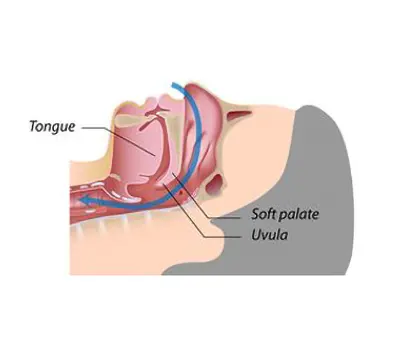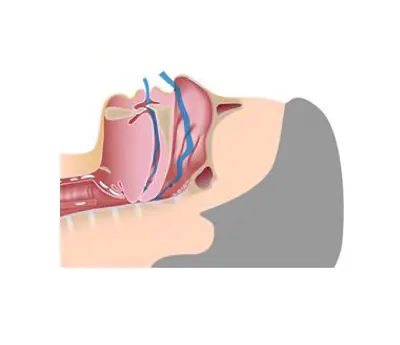When you breathe while sleeping, air enters your mouth and nose and freely passes through the back of your throat and into your lungs.


Over 70% of the time, loud snoring is indicative of some form of Obstructive Sleep Apnea.
Snoring is the fire alarm that something isn’t right with your airway.
90% chance of stroke
76% chance of congestive heart failure
58% chance of cardiac arrhythmias
37% chance of High Blood Pressure
Individuals suffering from obstructive sleep apnea (OSA) are much more prone to developing cardiovascular issues than the general population is. In fact, 37% of OSA patients will eventually develop high blood pressure, and that can cause a whole catalog of other medical issues all by itself. There is a 58% chance that an OSA patient will develop some type of cardiac arrhythmia, which in layman's terms is an irregular heartbeat. This can also be a serious condition, because it means the electrical signals governing a person's heartbeat are not working properly. OSA patients have a 76% of developing congestive heart failure, which involves the heart failing to pump blood efficiently. While this is not a condition which means imminent death, it often leads to premature death unless some kind of measure like a pacemaker or defibrillator is installed. Finally, there is also a 90% chance that an OSA patient will eventually suffer a stroke, and the fallout from an event like that can be totally life-changing. Needless to say, it's much more advisable to treat the OSA condition when it's diagnosed, rather than dealing with the more serious cardiovascular conditions that may develop.
No content yet
Morning headaches and migraines are actually a very common symptom of obstructive sleep apnea. If you think you might have sleep apnea and haven't been diagnosed yet, those morning headaches that you've been bothered by might very well be directly tied to your sleep apnea. On the surface, the two conditions might not seem related, but there's actually a very close connection between them. Anyone who suffers from obstructive sleep apnea will usually have their airway partially or completely blocked as they sleep, and that's why they wake up frequently gasping for air.
Since the airway gets closed numerous times as you sleep, the amount of oxygen which reaches your brain is effectively reduced. This puts you at risk for high blood pressure, strokes, heart attacks - and headaches or migraines. The fact that your brain receives inadequate oxygen during the night causes all the symptoms of a migraine the next morning. You can, of course, take medications to relieve the pain from your headaches, but if you think you might have sleep apnea, you should consult with your doctor right away. Sleep apnea is a serious condition that can lead to all kinds of other health problems, and it should not go untreated.
86% chance of Type II Diabetes
It's considerably more difficult to manage diabetes if you also have obstructive sleep apnea (OSA). When OSA causes interruptions in your breathing at night, this can lead to a buildup of carbon dioxide in the bloodstream. That in turn promotes insulin resistance which makes it difficult for the body to effectively use insulin. This causes additional sugar to filter into the bloodstream, and to elevate blood pressure. Over a period of time, this will cause cardiovascular problems and possibly even disease. Before that happens, you may also experience an increased frequency of headaches, as well as more severe headache episodes. When you don't get enough rest at night because of OSA, that will also make you more irritable and fatigued, and it can affect your relationships with everyone you know. If you are a diabetes patient, that makes it extremely important to determine whether or not you also have obstructive sleep apnea, because there will be several other impacts that you'll have to deal with.

80% chance of sexual dysfunction
It's very common for people who suffer from obstructive sleep apnea (OSA) to get inadequate sleep at night, particularly if the condition has not yet been diagnosed. This can have a major impact on fertility for both males and females. One of the reasons for this is that during sleep, hormones are released by the body that promote rejuvenation and recovery from the stresses of the day. When you don't receive adequate sleep at night, you're much more susceptible to illness and stress, and it's likely that your immune system will also be compromised. This has a major impact on a person's fertility, and it's one of the most overlooked causes for couples unsuccessfully trying to conceive.

It has been estimated by the National Sleep Foundation that 65% of all Americans do not receive the necessary seven to nine hours of sleep each night. If you're a person suffering from obstructive sleep apnea, this could be one of the major reasons that fertility is a problem.
87% chance of daytime sleepiness
If you wake up every day feeling tired, or if you have a headache upon waking up, it's very possible that you might be suffering from obstructive sleep apnea (OSA). People bothered by this medical condition have an 87% chance of experiencing excessive daytime sleepiness, and that can have a major impact on your normal daily life. You may have noticed that you wake up frequently at night, because people bothered by OSA will generally have at least five pauses in their breathing every hour, and there could be many more than that. The net effect of these frequent wake-ups is that you don't get a good night's sleep, and that naturally causes you to be fatigued throughout the following day. You might also notice that you have difficulty concentrating during the day, or that you have frequent mood changes which you can't explain. Your partner may notice that you snore loudly at night, or that you snort or make choking sounds when you begin breathing again after a pause has occurred. All of these are clear signs that you may have OSA, and that means you should seek treatment promptly.
77% chance of obesity
It may seem like there's no direct link between obstructive sleep apnea (OSA) and obesity or significant weight gain, but the truth of the matter is that there is a very strong association between the two. People who are troubled by OSA and have not sought treatment for it, will often get inadequate sleep, and that leads to excessive drowsiness and fatigue the next day. When this goes on for an extended period of time, it can cause a person to be lethargic and lack motivation most of the time. That will inevitably cause a drop off in exercise and activity, and it can lead to noticeable weight gain. Statistics show that people who have obstructive sleep apnea which goes untreated are 77% more likely to become obese than the normal population. This is another good reason why if you suspect that you might have sleep apnea, you should seek medical advice to confirm or disprove it. There are numerous potential health issues which can develop when a person suffers from OSA, and unexplained weight gain is just one of them.
60% chance of gastroesophageal reflux disease (GERD)
Obstructive sleep apnea (OSA) and gastroesophageal reflux disease (GERD) do not appear to be related on the surface of things. However, a considerable body of research has shown that there really can be a direct connection between these two medical conditions. OSA occurs when a person's airway is blocked by the soft tissue situated at the back of the throat. About 60% of all people afflicted by OSA will also have chronic acid reflux, or GERD. Acid reflux happens when the lower esophageal sphincter stays in an open position, allowing the backflow of gastric acid into the esophagus. When this happens, a person might experience unpleasant heartburn, possibly some chest pain, bad breath, and sometimes even a sour taste in the mouth. Both OSA and GERD will have an impact on a person's sleeping habits at night, and both will cause disruptions to a good night's sleep. What you need to know is that if you're suffering from OSA, you are much more likely to also develop the GERD condition, so you should be on the lookout for its symptoms. Both conditions are treatable, provided that you contact a medical professional and are diagnosed.
48% chance of Nocturia (Frequent Urination at Night)
People suffering from obstructive sleep apnea (OSA) have a 48% chance of also developing nocturia, which is basically the frequent urge to urinate at night. One or two trips to the bathroom at night is perfectly normal, but many individuals suffering from OSA are obliged to make five or six trips, and sometimes even more, during the course of any given night. While excessive snoring is probably the most common symptom of OSA, nocturia is the second most common symptom, therefore affecting a great many individuals. If you're talking to your doctor about your poor sleeping habits, you should mention any occurrence of excessive urination at night, because this is one of the markers for OSA. Many patients don't bother reporting it to their medical doctor, and instead talk to their gynecologist or their urologist. That's how this often gets overlooked as a symptom of OSA, when in reality it's one of the clearest markers for the medical condition. It is thought that the frequent trips to the bathroom are triggered by frequent wake-ups associated with OSA, and in any case there remains a strong relationship between the two.
30% chance of sudden death
It's no exaggeration to say that taking a sleep apnea test could actually save your life. People troubled by obstructive sleep apnea (OSA) may stop breathing at night for 10 seconds at a time, and for as many as 30 times in any given hour. What this all boils down to is that there's a 30% chance that someone afflicted by OSA could experience sudden death due to the condition. This stems from the fact that a person routinely has low oxygen levels, and that means that the bloodstream is generally inadequately supplied with the oxygen that's necessary throughout the body. When oxygen saturation dips below 78% in the body, the risk of sudden cardiac death increases by a whopping 80%. In addition to all the potential cardiovascular diseases which could be triggered by OSA, as well as all the minor symptoms like headaches and fatigue, there is also a significant risk of sudden death. All this makes it extremely important that you have the condition diagnosed and treated, so that you can avoid all the potential pitfalls associated with OSA.
58% chance of mood disturbance Depression, Anxiety, Loss of Motivation

When you have obstructive sleep apnea (OSA), it can affect your brain in a number of ways, causing irritability, fatigue, and difficulty focusing. It also changes brain function because of abnormal levels of chemicals in the brain. Glutamate is a chemical which is associated with stress response, and gamma-aminobutyric acid (GABA) is a mood inhibitor that helps to maintain your calm attitude. People with OSA typically have high levels of glutamate and very low levels of GABA. The low level of GABA makes it difficult to rest and relax, while the high levels of glutamate cause you to be stressed out more of the time. This in turn leads to a major impact on your mental health, and that can cause a 58% chance of mood swings, depression, anxiety, and complete loss of motivation. All of these mental health issues can be directly attributable to the chemical imbalance in your brain which results from persistent OSA. That makes it advisable to be diagnosed for the condition, and have it treated to prevent both the physical and mental impacts it can have on you.
Studies have found that couples dealing with snoring issues had a higher divorce rate
Lack of sleep can create a hostile environment.
Apart from all the physical and mental impacts that obstructive sleep apnea (OSA) can have on you, it can also have some very negative impacts on relationships with everyone you know. It's entirely possible that sleep apnea can cause a person to be considered much less attractive to their partner, because the condition generally makes you irritable, constantly fatigued, unfocused, and unwilling to participate in activities. This can literally tear apart couples and destroy relationships if the condition goes untreated, and behavior remains the same for an extended period of time. People suffering from OSA commonly become moody and withdrawn, and that is never a good formula for maintaining a relationship. Studies have shown that couples who have had to deal with persistent snoring issues, as well as some of the other symptoms associated with OSA, have a significantly higher divorce rate than other couples. This is not surprising since a very hostile environment can be created when an individual doesn't receive adequate sleep, and is obliged to try and function every day while feeling constantly sleepy. For the sake of your relationships, if you suspect that you might have OSA, be sure to get diagnosed so that some form of treatment can save you from health issues and from relationship issues.
86% chance of Type II Diabetes
It's considerably more difficult to manage diabetes if you also have obstructive sleep apnea (OSA). When OSA causes interruptions in your breathing at night, this can lead to a buildup of carbon dioxide in the bloodstream. That in turn promotes insulin resistance which makes it difficult for the body to effectively use insulin. This causes additional sugar to filter into the bloodstream, and to elevate blood pressure. Over a period of time, this will cause cardiovascular problems and possibly even disease. Before that happens, you may also experience an increased frequency of headaches, as well as more severe headache episodes. When you don't get enough rest at night because of OSA, that will also make you more irritable and fatigued, and it can affect your relationships with everyone you know. If you are a diabetes patient, that makes it extremely important to determine whether or not you also have obstructive sleep apnea, because there will be several other impacts that you'll have to deal with.
In addition to all the health issues that might arise in a person suffering from obstructive sleep apnea (OSA), it is also possible for a number of oral health issues to develop. For example, the development and the progress of periodontal disease can be accelerated when a person has OSA, as can bruxism (teeth grinding), and temporomandibular joint (TMJ) disorders. People who have sleep apnea are three times more likely to also suffer from some type of TMJ disorder. Symptoms of a TMJ disorder include jaw pain, problems chewing, jaw joints which click or grind, locked jaw, and pains which are felt throughout the neck, head, and shoulders. When you have a good night's sleep most of the time, you will be able to avoid bad breath, mouth ulcers, and the development of gum disease. Bruxism is more likely for individuals troubled by OSA, and this could lead to eroded tooth surfaces, chipping, and possibly even broken teeth. It's also more likely that OSA patients breathe through their mouths, and this can dry up the salivary glands, resulting in greater incidence of tooth decay and bad breath. Suffice to say that quite a few oral health issues can develop for the person bothered by OSA, who doesn't have the condition treated promptly.
Get Answers